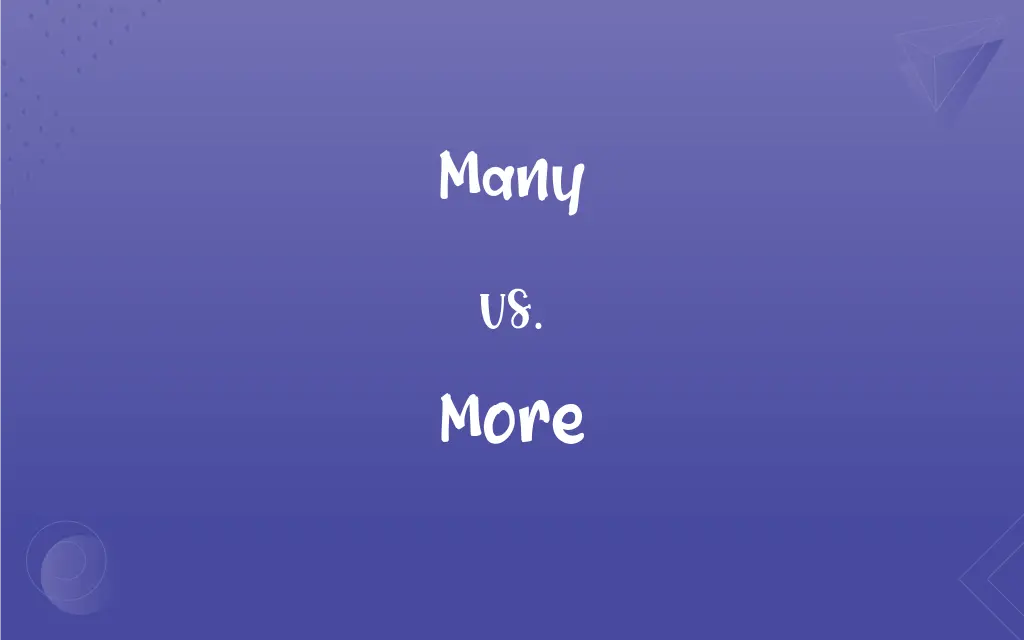Many vs. More: What's the Difference?
Edited by Janet White || By Harlon Moss || Published on January 3, 2024
"Many" refers to a large number of items or occurrences, while "more" is a comparative term indicating a greater amount or number than something else.

Key Differences
"Many" is used to describe a large quantity or number, often in a general sense. For example, "many people attended the concert." In contrast, "more" is comparative, used to indicate an increase or a greater amount relative to another quantity, as in "more people attended this concert than the last one."
"Many" can stand alone as a quantifier, while "more" always requires a point of comparison, whether stated or implied. For instance, saying "There are many books on the shelf" doesn't necessitate a comparison, but "There are more books on this shelf than the other" does.
"Many" is typically used with countable nouns, referring to a large number of individual items or instances. "More," however, can be used with both countable and uncountable nouns, indicating a larger quantity or degree.
In terms of grammatical structure, "many" is an indefinite pronoun and adjective, whereas "more" is a comparative adjective or adverb. For example, "many are called, but few are chosen," versus "I need more time to finish the work."
"Many" often conveys the idea of a considerable amount but without direct comparison. "More," on the other hand, inherently carries a sense of comparison, suggesting an additional amount or degree beyond what is already present.
ADVERTISEMENT
Comparison Chart
Usage
Indicates a large number
Indicates a greater amount or number
Comparison
No inherent comparison
Always comparative
Noun Type
Generally with countable nouns
With both countable and uncountable nouns
Grammar Role
Indefinite pronoun/adjective
Comparative adjective/adverb
Implication
Signifies quantity
Suggests addition or increase
ADVERTISEMENT
Many and More Definitions
Many
A significant quantity or number.
She has read many books on the subject.
More
A greater or additional amount or degree.
He wants to spend more time with his family.
Many
Used to express a large variety.
There are many ways to solve this problem.
More
Comparative form of 'much' and 'many.'
She has more books than her friend.
Many
Referring to a large part of a group or class.
Many people believe that exercise is beneficial for health.
More
Referring to an extra quantity.
Can I have some more cake?
Many
A large number of; numerous.
Many students are planning to attend the field trip.
More
Used to indicate further extent or degree.
The problem is more complicated than it seems.
Many
A considerable amount.
Many hours were spent organizing the event.
More
Signifying an increase in quantity, amount, or degree.
As the project progressed, it required more resources.
Many
Amounting to or consisting of a large indefinite number
Many friends.
More
Greater in number
A hall with more seats.
Many
Being one of a large indefinite number; numerous
Many a child.
Many another day.
FAQs
Is 'more' only used with countable nouns?
No, 'more' can be used with both countable and uncountable nouns.
What is the grammatical role of 'more'?
It's a comparative adjective or adverb.
Does 'many' require a comparison?
No, 'many' doesn't inherently require a comparison.
In what grammatical role is 'many' typically found?
As an indefinite pronoun or adjective.
What does 'many' imply?
Refers to a large number or quantity, often without a direct comparison.
Can 'many' be used with uncountable nouns?
Generally, 'many' is used with countable nouns.
Does 'more' imply a specific quantity?
No, it indicates a comparative increase but not a specific amount.
Can 'more' be used in questions?
Yes, particularly in asking for an additional amount or degree.
How do you decide whether to use 'many' or 'more'?
Use 'many' for stating a large quantity and 'more' for comparing quantities.
How is 'more' used differently from 'many'?
'More' is used comparatively, indicating a greater amount or number than something else.
Can 'many' and 'more' be used interchangeably?
Not usually, as they serve different grammatical and contextual purposes.
Is 'more' always relative?
Yes, it implies a comparison and is relative.
Are there exceptions to using 'many' with countable nouns?
Generally, it's used with countable nouns, but idiomatic exceptions exist.
In what situations is 'more' commonly used?
When comparing or indicating an increase in quantity, degree, or extent.
Does 'many' have different forms?
No, 'many' remains the same in all its uses.
How does context affect the use of 'many' and 'more'?
Context determines their usage; 'many' for quantity, 'more' for comparison.
How does 'many' interact with plural nouns?
It's typically used before plural nouns to indicate a large number.
Are 'many' and 'more' used differently in spoken and written English?
Their usage is consistent in both spoken and written forms.
Can 'more' be used as a standalone response?
Yes, often in response to questions or requests for additional amounts.
Can 'many' be quantified?
It's a general term and isn't usually quantified.
About Author
Written by
Harlon MossHarlon is a seasoned quality moderator and accomplished content writer for Difference Wiki. An alumnus of the prestigious University of California, he earned his degree in Computer Science. Leveraging his academic background, Harlon brings a meticulous and informed perspective to his work, ensuring content accuracy and excellence.
Edited by
Janet WhiteJanet White has been an esteemed writer and blogger for Difference Wiki. Holding a Master's degree in Science and Medical Journalism from the prestigious Boston University, she has consistently demonstrated her expertise and passion for her field. When she's not immersed in her work, Janet relishes her time exercising, delving into a good book, and cherishing moments with friends and family.






































































